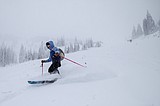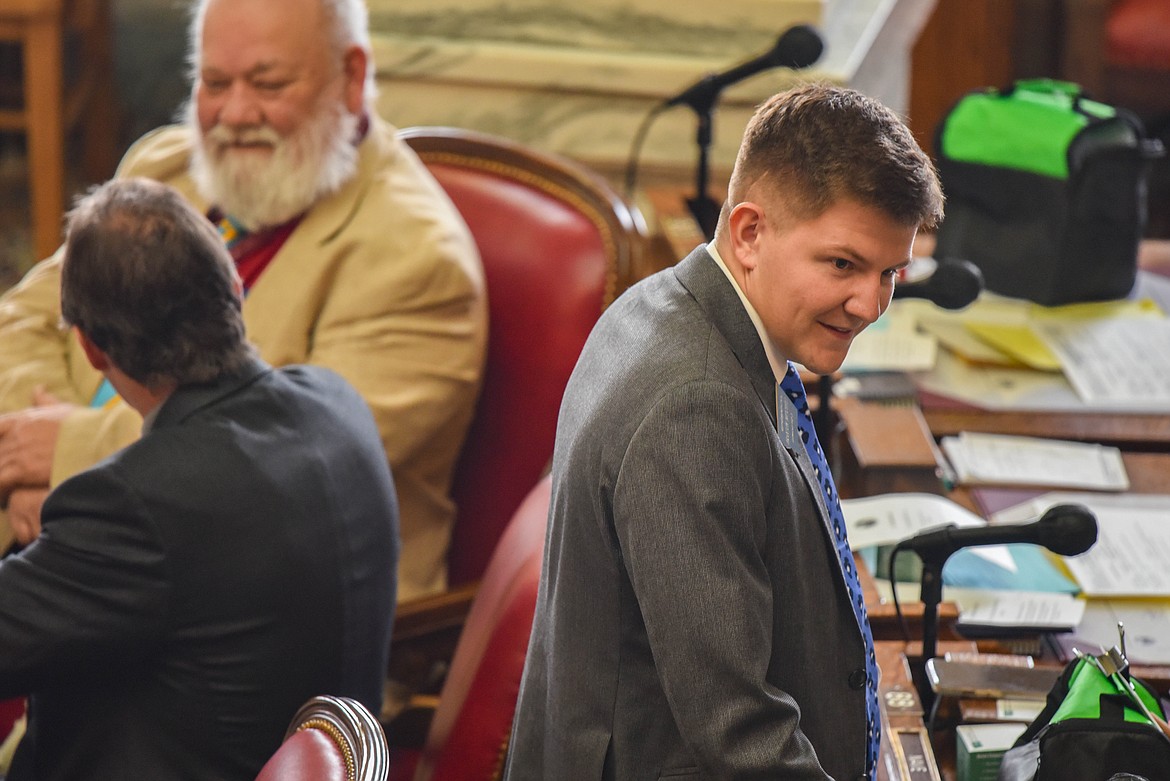Bill aimed at drag shows gets hearing in House Judiciary Committee
KATE HESTON | Hagadone News Network | UPDATED 2 years, 10 months AGO
Kate Heston covers politics and natural resources for the Daily Inter Lake. She is a graduate of the University of Iowa's journalism program, previously worked as photo editor at the Daily Iowan and was a News21 fellow in Phoenix. She can be reached at [email protected] or 406-758-4459. | February 9, 2023 11:00 PM
Critics lambasted a bill aimed at restricting drag shows during a House Judiciary Committee hearing Thursday as rife with possible unintended consequences while supporters described it as a commonsense measure to protect children.
Sponsored by Rep. Braxton Mitchell, R-Columbia Falls, House Bill 359 would prohibit minors from attending drag shows and entering sexually oriented businesses as well as ban drag performances in libraries and schools that receive state funding. Mitchell, a member of the House Judiciary Committee, said his legislation aimed to protect minors.
He called drag shows, which have emerged as a political flashpoint nationally, potentially damaging to a child’s psychological well being and general welfare.
“There is clearly a sick agenda being pushed here,” Mitchell said.
The bill is modeled after similar legislation taken up by state houses around the country, according to Mitchell.
Mitchell’s bill comes after high profile debates around several drag events geared toward children in Montana over the summer. A drag queen story hour at ZooMontana in Billings in June drew rebukes from U.S. Sen. Steve Daines and U.S. Rep. Matt Rosendale. In July, a drag queen story hour event in Helena saw overwhelming attendance after receiving online threats in the run up to the event.
Critics of Mitchell’s proposed law came out in force during Thursday’s hearing, the first opportunity to debate the bill. Many argued that most drag events occur at venues off limits to children anyway. Others saw the proposed restrictions as potentially unconstitutional.
Akilah Deernose, staff attorney with the American Civil Liberties Union of Montana, argued the bill unconstitutionally censors creative expression and places limits on parental rights.
“This bill is nothing more than a solution in search of a problem that doesn’t exist,” Deernose said.
Shani Henry, a mother of two, opposed the bill for potentially intruding on the rights of parents. She and her husband had sought to broaden their children’s horizons during their upbringing, she said.
“Homosexuality is not contagious and no grooming occurs here. It is my right as a parent to decide if I take my kids to these events,” Henry said.
Supporters, though, worried that drag shows in public spaces pose a risk to children. Jessie Browning, a mom supporting the bill, said that when establishments like a zoo hold drag-related events, they are encouraging hyper sexualization.
Another backer, Donna Elford, talked about her discomfort with children attending drag events out of concern of children growing comfortable with drag queens, which could lead to them becoming sexualized. Cathy Carlson, a mother, argued that children should grow up with their innocence intact.
Tim Adams, who described himself as gay and involved in the drag show scene, also lent support for the bill, stating that the intention of drag is to express female sexuality, making it inherently sexual. Adams was the only drag performer to testify in support of the bill.
Supporters in attendance also included State Superintendent Elsie Arntzen and Jenna McKinney, cofounder of Montana Family Rights Alliance.
THE BILL’S opponents also worried about unintended consequences.
Charley Macorn, a comedian, testified that they often wear women's clothing and occasionally sing during their sets.
Under this bill, Macorn worried they were at risk of legal trouble. They added that using clothing to define gender is unacceptable.
“We have to make sure that we are defending our constitutional right of expression and our constitutional right to express ourselves,” Macorn said.
Corinne Woods, who works for a theater administration in Helena, worried that the broad definition of drag shows would affect theater performances.
Mitchell’s bill defines a drag show as a “performance in which a performer exhibits a gender identity that is different than the performer’s gender assigned at birth using clothing, makeup, other or other physical markers and sings, lip syncs, dances, or otherwise performs for entertainment for appeal to a prurient interest.”
Other industry professionals echoed Woods’ concerns, citing the lack of any wording in the proposed legislation that separates theater from drag shows. For example, if a woman played Peter Pan, which often happens due to the high vocal range required for the part, that could be considered a drag performance.
Amanda Curtis, president of Montana Federation of Public Employees, said she opposed the bill because it grants the Legislature authority to revoke a teacher’s license. Curtis questioned whether legislators should hold that power.
Elani Borhegyi, who also stood in opposition to the bill, served as a reader at one of the children’s drag story hours over the summer. Borhegyi showed an example of what drag performers wear to these readings: covered shoulders, layers, capes, hair pieces, face makeup or paint, glitter and more.
Borhegyi said the story hours are a way to emphasize the values of love, community and acceptance. Pressed on why performers needed to be in drag to show kids these attributes, Borhegyi responded by saying it was one of many ways to share those values through an engaging art form.
“Sharing stories and teaching good values is protecting kids,” Borhegyi said.
After nearly two hours of testimony and questions, Mitchell offered closing remarks, saying he heard no testimony from the opposition making the case for why a child should attend a drag show.
“This is not an attack on drag, this bill is to protect children,” he said.
The bill requires committee approval before going to the House floor. A vote in the House Judiciary Committee has not yet been scheduled.
Reporter Kate Heston can be reached at [email protected].
ARTICLES BY KATE HESTON

Veteran-owned mobile boat repair service anchors down in the Flathead Valley
The Kramers launched Flathead Mobile Marine to use their skills — they have decades of experience performing routine maintenance checks on a variety of boats as well as working with engines and electrical systems — and help boaters in the community.

With ski season near, resort reaches deal with staff
After 18 months of negotiations, Whitefish Mountain Resort executives and the resort’s ski patrol union are finalizing a one-year contract for the upcoming season.

Trapped in a car wreck, Woods Bay woman credits teens with saving her life
Driving home from a quilting event in Bigfork in September of last year, Carol Martin remembered that the sky was clear, the sun was shining, and she had a headache.

